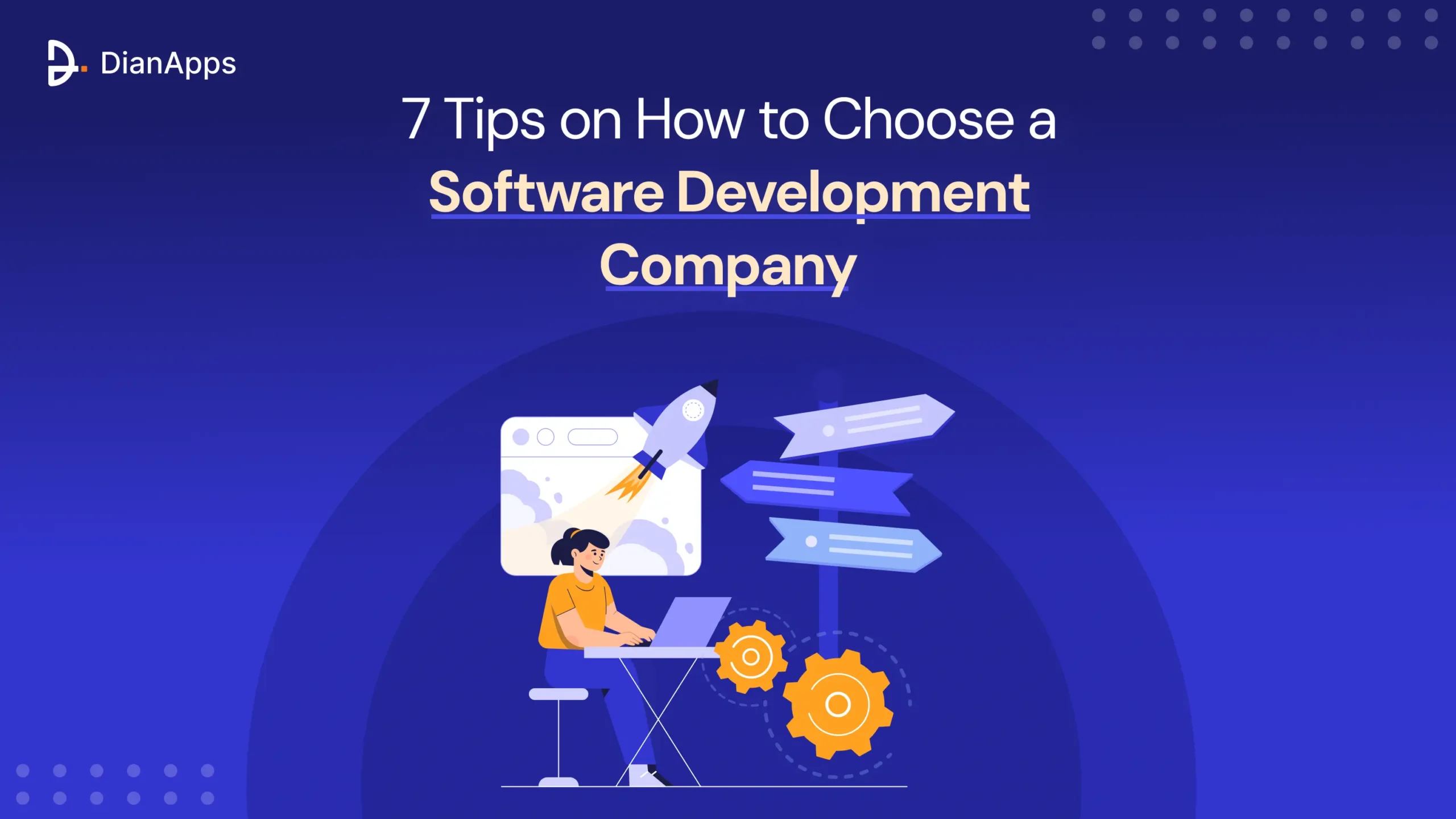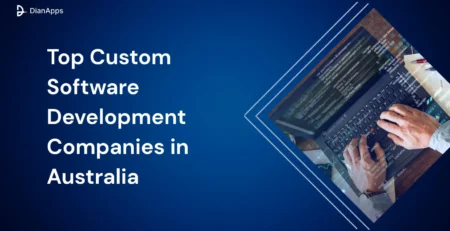7 Tips on How to Choose a Software Development Company
What if the biggest risk to your software project isn’t the technology but the team you pick to build it? According to Grand View Research in 2025, the custom software development market is exploding, estimated to be worth over $146 billion by 2030, with a compound annual growth rate of 22.5%. Yet despite a pool of nearly 29 million developers worldwide, finding the right software company remains one of the biggest headaches for businesses across industries.
Why? Because the right code is meaningless without the right partnership. Poor communication, misaligned expectations, security oversights, or a lack of domain expertise can quickly turn promising projects into costly failures. And with 85% of companies now investing in enterprise software solutions, your choice of vendor could be the difference between scaling and stalling.
This blog isn’t just another list of tips; it’s a practical, research-backed guide designed to arm you with everything you need to make an informed, confident decision. If you’ve ever felt overwhelmed by the options or uncertain about where to start, keep reading this blog. We’ll break down exactly what to look for, from defining your project needs to vetting portfolios and assessing cultural fit, so you can sidestep common pitfalls and find a software development partner who truly understands your vision.
1. Get Crystal Clear on What You Need
Before searching for your software development partner, step one is all about understanding your own needs with clarity. Far too often, companies dive into vendor discussions with vague ideas or incomplete requirements, and this sets the stage for miscommunication and wasted time.
Start by taking a step back and asking some fundamental questions:
- What problem am I trying to solve with this software?
- Who will be using it: customers, employees, or both?
- What are the core features and must-haves?
- What technologies or platforms do I envision (mobile, web, cloud)?
- What budget and timeline constraints are we facing?
Writing these down might seem basic, but it’s crucial. Having a clear project scope not only helps potential vendors understand what you want but also allows you to evaluate their fit more effectively.
For instance, if your goal is to develop a customer-facing mobile app integrated with AI-based recommendations, you want a company like DianApps experienced not just in mobile development but with machine learning expertise. In contrast, an internal business process automation tool may require more focus on integration with existing enterprise systems.
In 2025, research shows that the majority of failed software projects attribute issues to poorly defined requirements or shifting scopes during development. Laying a strong foundation here helps prevent project creep and budget overruns later on.
2. Look for Relevant Experience and Tech Know-How
The software world moves quickly, and no single company excels at everything. Instead of picking a vendor because they are big or cheap, focus your search on companies with proven expertise in the technologies and industries that matter to your project.
Ask potential partners about:
- Their primary technology stacks (e.g., JavaScript frameworks, Python, .NET, AI tools)
- Experience with emerging technologies like low-code/no-code platforms, blockchain, or cloud-native architectures
- Case studies in your industry vertical (healthcare, fintech, e-commerce, manufacturing, etc.)
- Development methodologies they follow (Agile, DevOps, Continuous Integration/Continuous Deployment)
For example, in 2025, up to 70% of new applications incorporate low-code or no-code app builders or tools for faster deployment and easier maintenance. A company adept in these technologies might bring your concept to life more swiftly and with fewer bugs.
Additionally, find out how the company keeps technical skills up to date. Tech evolves rapidly, and you want partners who invest in ongoing learning and experimentation.
Technical competence alone, however, isn’t enough. Look for a company that can also offer strategic advice, helping you choose the right tools and architecture for scalability, security, and maintainability. Agile partners won’t just build to spec; they’ll help you rethink solutions to maximize business value.
3. Dig Into Their Portfolio Quality Speaks Louder Than Words
A company’s portfolio is like its resume. It’s one of the best ways to verify claims and understand what kind of projects they’ve handled.
But don’t just skim for pretty screenshots or project titles. Request detailed case studies that show:
- What challenges does the client face
- How the development company approached the solution
- Technologies used and why
- Results achieved (efficiency gains, increased revenue, improved user engagement)
- Problems encountered and how they were solved
Through detailed portfolios, you can assess if the company has experience with projects similar in complexity or scale. According to industry observations in 2025, about 85% of new software projects are tailored enterprise applications, requiring robustness, security, and seamless integrations.
Furthermore, portfolios reveal if a company can innovate or just stick to cookie-cutter solutions. Projects that highlight problem-solving and customization are often signs of a thoughtful partner.
Also, look for diversity in industries and project types which suggests flexibility and a broad experience base.
Recommended Read: How Custom Software Development Can Benefit Your Business
4. Seek Out Honest Reviews and References
Even the best portfolios can gloss over day-to-day realities. For that, you need honest feedback from previous clients.
Online review sites such as Clutch, GoodFirms, or TrustRadius have become critical resources for software buyers. They provide verified reviews on a company’s communication, project management, technical skills, and after-sales support.
When reading reviews:
- Pay more attention to detailed comments than star ratings
- Look for consistency in feedback across multiple projects
- Notice if clients mention transparency, responsiveness, or how challenges were handled
Don’t hesitate to ask the vendor for client references, too. A direct conversation can surface invaluable insights:
- How well did the company meet deadlines?
- Was the project delivered within budget?
- How was collaboration during crunch times?
- What happens after project delivery? (bug fixes, updates, support)
In a survey conducted last year, nearly 98% of buyers stated that client reviews and references were the most influential factor in their decision-making process.
5. Communication Is More Than Just Words
Imagine this: Your development team delivers great code, but you’re left in the dark about progress or roadblocks for weeks at a time. Frustrating, right? Communication can make or break your software project as much as technical skills.
Before you sign any contract, evaluate:
- How well the company listens to your needs and concerns
- Whether they provide a dedicated project manager or a single point of contact
- The frequency and format of updates (daily stand-ups, weekly reports, demos)
- Their flexibility in adapting communication to your preferred style and time zone
Agile development processes embrace transparency and ongoing collaboration, and most top companies today follow these principles meticulously. They involve clients regularly, show incremental progress, and gather feedback continuously.
Sound project management and transparent communication will help avoid costly misunderstandings, minimize delays, and ensure expectations are aligned at every stage.
6. Don’t Overlook Security, Compliance, and Ownership Details
In an era when data breaches make headlines weekly, security should be a fundamental criterion for picking a software development company. Especially if your application deals with sensitive user data or is subject to regulations such as GDPR (Europe), HIPAA (healthcare), or SOC 2 (service providers), your partner’s approach to security cannot be an afterthought.
Ask specific questions like:
- What security certifications or audits do they have?
- How do they ensure secure coding practices and regular vulnerability assessments?
- What tools do they use for threat detection and management?
- How do they handle data privacy and compliance requirements?
Another critical point many companies overlook is intellectual property (IP) ownership. Clarify from the beginning who owns the finished code, designs, and any patents or trademarks developed during the project. Transparent contract clauses on IP avoid disputes down the road and protect your business assets.
7. Cultural Fit and Long-Term Partnership Potential Matter
Finally, successful software projects and beyond rely on more than just skills; they thrive on a genuine partnership.
What do we mean by cultural fit?
- Do you share similar communication styles and work ethics?
- Are their working hours compatible, or do time zone differences create delays?
- Do they understand and respect your business domain and vision?
Choosing a company with whom you can build trust will make the inevitable bumps in the road easier to navigate. Software is never static; it requires updates and sometimes pivots based on user feedback or market changes.
Look for top software development companies that demonstrate enthusiasm for your project and show a willingness for ongoing collaboration and support.
Final Words
Choosing a custom software development company in 2025 is a critical business decision that needs careful planning and research. With the custom software market growing rapidly and technology evolving fast, the stakes are high.
By focusing on clear project requirements, evaluating relevant expertise, thoroughly vetting portfolios and reviews, prioritizing communication, insisting on security and legal clarity, and seeking a cultural match, you set a solid foundation for success.
Remember, technology is simply a tool. The true value comes from the people building and supporting it.
Suppose you take the time to do your homework and consider these seven tips. In that case, you will be well-positioned to find a software development partner who not only delivers quality code but truly aligns with your vision and helps your business thrive.




